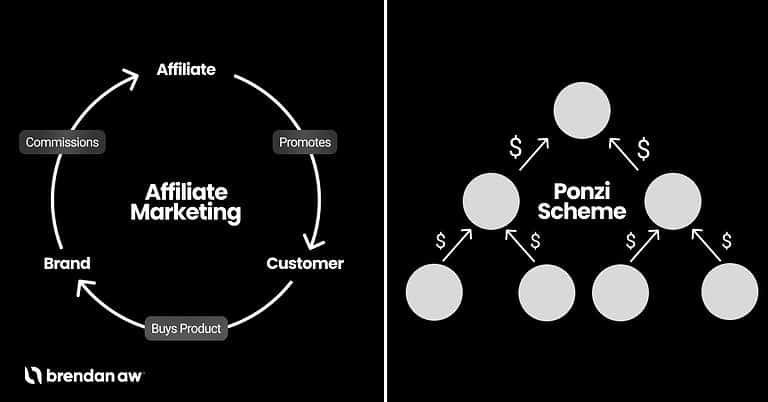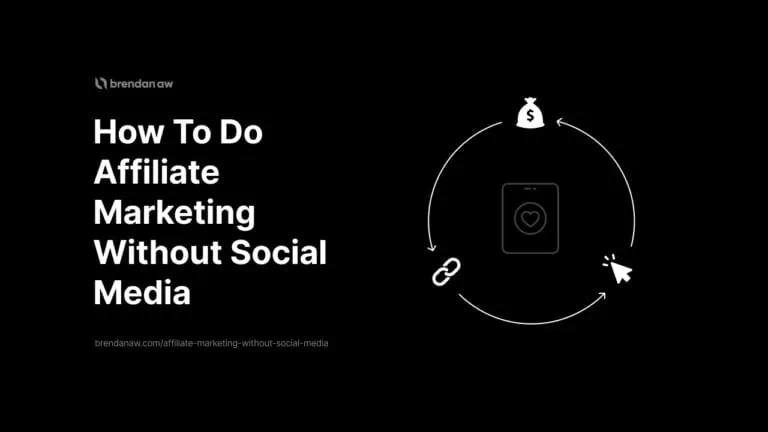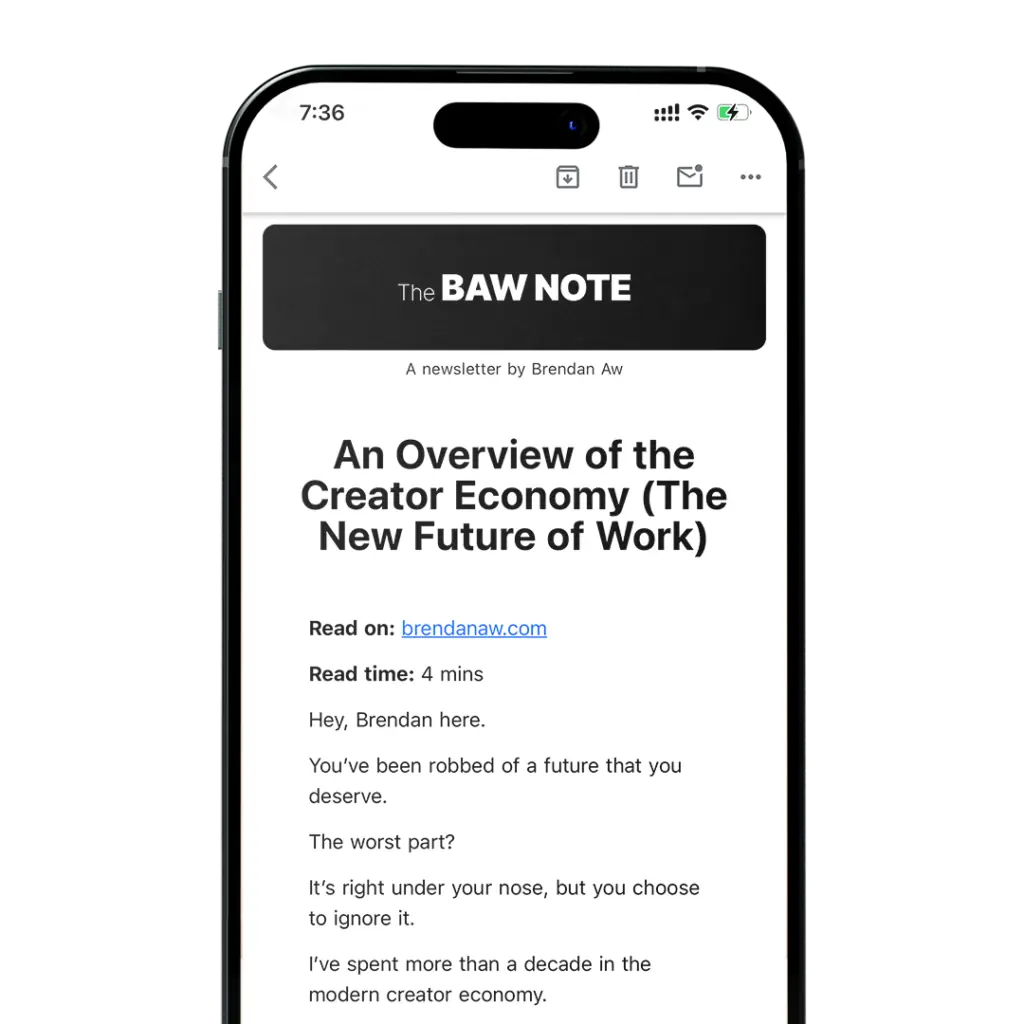The simple answer is NO.
But I can’t really leave it at that.
The global affiliate market is set to grow to around $14.3 billion in 2023 and is estimated to reach $15.7 billion by 2024.
It’s a valuable market and one where many people want a slice of a very delicious pie (I feel a Homer Simpson moment coming on).
The industry is also dominated by giants such as Amazon and Shopify.
Whether you love or loathe them, these two names have earned high degrees of trust, and you know that such businesses would not be associated with pyramid schemes.
So if you want the full explanation of “Is affiliate marketing a pyramid scheme,” read on.
What Is Affiliate Marketing?
Affiliate marketing is a process where an affiliate marketer advertises an organization’s product or service on their behalf by using an affiliate link.
With the e-commerce sector forecast to see $4.11tn in global revenue in 2023, you can understand why many brands look to others to promote their products.
These affiliate links could be placed in a blog, on their website, or on social media platforms.
The whole point is for brands to get affiliates to promote their products in exchange for a commission.
It’s a win-win for both parties.
This is also essentially what I’m doing for this blog.
So now you see why a lot of creators start affiliate marketing?
What Is a Pyramid Scheme?
A pyramid scheme is an MLM (multi-level marketing) program. Pyramid schemes are illegal in most US states and the EU. On the surface, it can appear as a get-rich-quick scheme, but in reality, only those near the top of the pyramid stand to make any money.
I hope you’re not like I used to be and think there’s an Egyptian connection (there’s not).
They work in the form of staggered recruitment.
Early adopters invest money and return snowball when they recruit further people to the scheme.
And it’s a business model that often relies on members recruiting from friends and family.
Products and services such schemes offer are often overpriced (a lot), and the commission rates can be terrible.
When compared to the legitimate opportunities to earn a commission offered when you promote products on an affiliate program, a pyramid scheme can be a never-ending cycle of promoting crappy products in exchange for low earnings.
Why Do People Think Affiliate Marketing Is a Pyramid Scheme?
Affiliate marketing does have an accumulative earning structure where the more you refer, the more you earn.
That’s why people mistake it for a pyramid or Ponzi scheme.
Here’s an infographic so that you can visualize it.
The reality is that the two are very different and that affiliate marketing is not a pyramid or Ponzi scheme in any way.
The only similar thing is promoting products through a systemized funnel.
So, it’s not a scam.
I hope you got that.
Here are some pros and cons of affiliate marketing if you consider getting started.
What Is the Difference Between Affiliate Marketing and Pyramid Schemes?
If you get as confused as me by what the real differences are, then look at these main differences:
1) Legality
There are a lot of good reasons why many countries – including the US and those in the EU – have outlawed pyramid schemes.
I like to think of it as the difference between walking into a shop and stealing an item and walking into the same shop and buying that item.
The former is obviously illegal.
2) Payment Model
I love money, and I’m guessing you do too.
But there are right and wrong ways to make it.
So, if you are going to work to make that money, which would you prefer:
- A transparent system that rewards you with a commission for sales or other results?
- One where you are constantly chasing ever-elusive rewards?
I’ll leave you to guess which is which.
3) Fees
Would you pay a joining fee to work in a shop or office?
Probably not, yet most pyramid schemes demand a joining fee and often payment up front for stock.
Affiliate marketing programs very rarely ask for any sort of upfront fees.
In fact, none of the programs I’m in ever asked for a joining fee.
That’s just dumb.
I’m the one making content and promoting their products, so why the heck do I have to pay?
4) Recruitment
If you choose affiliate marketing, then you can either work alone or you can develop a network.
The choice is entirely yours.
With a pyramid scheme, a hierarchal network is the lifeblood of this whole system. Without which, there is no money to be made.
So there’s a ton of focus on recruiting new people to the scheme, as those initial joining fees are what pay the bills.
5) Simplicity
Affiliate marketing can be done by anyone with access to a computer or even a smartphone.
It can be a relatively simple business to run, though you will need at least a basic knowledge of things like SEO to generate traffic to your links.
With a pyramid scheme, that simplicity disappears as you will constantly be pressured to recruit new members and sell more products.
Even if those products suck donkey arse.
How Is Affiliate Marketing Not a Pyramid Scheme?
I really want to emphasize the legality aspect. Do you want to be a shoplifter or a customer?
Many countries have now made pyramid schemes illegal. Affiliate marketing is a legitimate business model practiced by thousands of companies, from small e-commerce businesses to global giants.
Although there are some similarities in business models, there are far more differences like the ones mentioned above.
Be very cautious if you see an affiliate program asking for a joining fee or upfront costs.
That should trigger your spidey sense and warn you that it might be a pyramid scheme.
These are some of the LEGIT skills and practices proper affiliate marketers display that a pyramid marketer will most likely not have:
- Ranking higher on search engines like Google prioritizes trust
- A proper website with good hosting if you choose to have one
- Solid content marketing and content creation skills
- Good level of product/service knowledge
Is Affiliate Marketing a Pyramid Scheme (FAQs)
Is Affiliate Marketing a Pyramid Scheme?
No, while there are some loose similarities, affiliate marketing is a legitimate business model that delivers on its promises of commission-based revenue. A pyramid scheme is a fraudulent model that often preys on the vulnerabilities of people with a low income.
Is Becoming an Affiliate Marketer a Legitimate Way To Make Money?
Yes, affiliate marketing is a legitimate way to make money online. As an affiliate marketer, you promote products or services through your website, blog, or social media channels and earn commissions when customers purchase using your affiliate links. It’s completely legit, and there’s nothing scammy about that.
Can an Affiliate Marketing Program Be Similar to Pyramid Schemes and MLMs?
You might think that affiliate marketing and MLMs share many commonalities, but if you look more closely at how each earns money, the differences are clear.
Affiliate marketers concentrate on advertising items or services to gain commissions based solely on verified sales earned through their promotions. Pyramid schemes or multi-level marketing programs often prioritize member recruitment over product selling.
This is risky business considering country regulations around pyramid-like structures.
While both networking approaches can seem similar initially, remember that affiliate marketing follows a performance-based model distinct from pyramid schemes or MLM operations.
What Should I Ask Before Joining an Affiliate Program?
Before joining an affiliate program, consider asking questions about the company’s background, product quality, commission rates, payment terms, prerequisites for joining, and the program’s general reputation in the industry.
Additionally, seek out reviews and testimonials from current and former affiliates to gain valuable insight into the program’s legitimacy and effectiveness.
To Sum Up
To wrap up our discussion on pyramid scams versus legitimate affiliate marketing practices.
Let’s agree that while the former is doomed to fail, inevitably resulting in financial losses for its victims, affiliates enjoy sustainable work conditions which can offer steady income streams depending on their efforts invested into it.
Trust also plays an integral role when comparing these two business models.
Affiliates are known for promoting quality products/services offered by reputable companies that have earned customer confidence through years of experience and good work ethics.
Whereas Pyramid scammers typically lure unsuspecting victims with subpar or overpriced items wrapped inside misleading promises of easy profits.
Alright, let’s not have this debate again.
So, my advice for creators is not to shy away from this anymore. Just do it.
Hope that clears things up!
If you liked the article, share it and comment below thanks!











